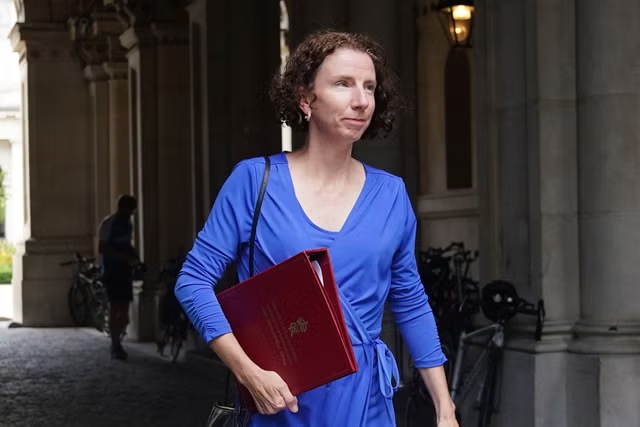WASHINGTON (AP) — Louisiana voters will decide which presidential candidates will receive their eight electoral votes in the Nov. 5 election. Also on the ballot are races for the U.S. House and a pair of statewide ballot measures.
The state has been reliably Republican in presidential contests since 2000, and much of the state — outside larger metropolitan areas such as New Orleans and Baton Rouge — has gone for the GOP. Fewer and fewer Louisiana residents are registered Democrats, while the number of GOP voters has grown.
Four of the state’s six U.S. House districts are considered safe for Republicans. A fifth is the New Orleans-anchored 2nd District, which has been safe for Democrats. A new wrinkle is the 6th District, a second majority Black district at the heart of a U.S. Supreme Court ruling in May. Two members of the House GOP leadership, Speaker Mike Johnson and Majority Leader Steve Scalise, are up for reelection.
Louisiana is unique in that the Nov. 5 election is an open primary for non-presidential races. That means the state has not yet held primaries to whittle down the field of candidates for office other than president.
To win a seat on Nov. 5, the top candidate must receive at least 50% of the vote, plus one. If no candidate reaches that mark, the top two vote-getters will go on to a Dec. 7 runoff that is known as Louisiana’s general election. All but one of the contests have at least three people running.
Votes for Democrats may be concentrated in the earliest and latest counts on election night. At the beginning of the night, mail ballots and early in-person votes are centrally tabulated and released as one precinct, usually as the first report. Mail ballots have traditionally skewed toward Democratic candidates, though the gap has been growing smaller. Toward the end of the night, vote counts from New Orleans and East Baton Rouge — Democratic strongholds — tend to come in after many other parishes. The question tends to be what impact those early and late bursts of votes for Democrats will be in an increasingly Republican state.
The AP does not make projections and will declare a winner only when it has determined there is no scenario that would allow the trailing candidates to close the gap. If a race has not been called, the AP will continue to cover any newsworthy developments, such as candidate concessions or declarations of victory. In doing so, the AP will make clear that it has not yet declared a winner and explain why.
Here’s a look at what to expect in the 2024 election in Louisiana:
Election Day
Nov. 5.
Poll closing time
9 p.m. ET.
Presidential electoral votes
8 awarded to statewide winner.
Key races and candidates
President: Harris (D) vs. Trump (R) vs. Robert Kennedy Jr. (Independent) vs. Chase Oliver (Libertarian) vs. Jill Stein (Green) vs. Cornell West (Justice for All) and four others.
Other races of interest
U.S. House and a ballot measure.
Past presidential results
2020: Trump (R) 58%, Biden (D) 40%. AP race call: Tuesday, Nov. 3, 2020, 9 p.m. ET.
Voter registration and turnout
Registered voters: 3,019,315 (as of Oct. 1, 2024). About 38% Democrats, 35% Republicans and 28% other.
Voter turnout in 2020 presidential election: 69% of registered voters.
Pre-Election Day voting
Votes cast before Election Day 2020: about 46% of the total vote.
Votes cast before Election Day 2024: See AP Advance Vote tracker.
What to know about the 2024 Election
- Today’s news: Follow live updates from the campaign trail from the AP.
- Ground Game: Sign up for AP’s weekly politics newsletter to get it in your inbox every Monday.
-
AP’s Role: The Associated Press is the most trusted source of information on election night, with a history of accuracy dating to 1848. Learn more.
How long does vote-counting take?
First votes reported, Nov. 3, 2020: 9:06 p.m. ET
By midnight ET: about 88% of total votes cast were reported.
___
Associated Press writer Rebecca Reynolds contributed to this report.
___
Read more about how U.S. elections work at Explaining Election 2024, a series from The Associated Press aimed at helping make sense of the American democracy. The AP receives support from several private foundations to enhance its explanatory coverage of elections and democracy. See more about AP’s democracy initiative here. The AP is solely responsible for all content.
What to know about the 2024 Election
- Today’s news: Follow live updates from the campaign trail from the AP.
- Ground Game: Sign up for AP’s weekly politics newsletter to get it in your inbox every Monday.
-
AP’s Role: The Associated Press is the most trusted source of information on election night, with a history of accuracy dating to 1848. Learn more.
Disclaimer: The copyright of this article belongs to the original author. Reposting this article is solely for the purpose of information dissemination and does not constitute any investment advice. If there is any infringement, please contact us immediately. We will make corrections or deletions as necessary. Thank you.



